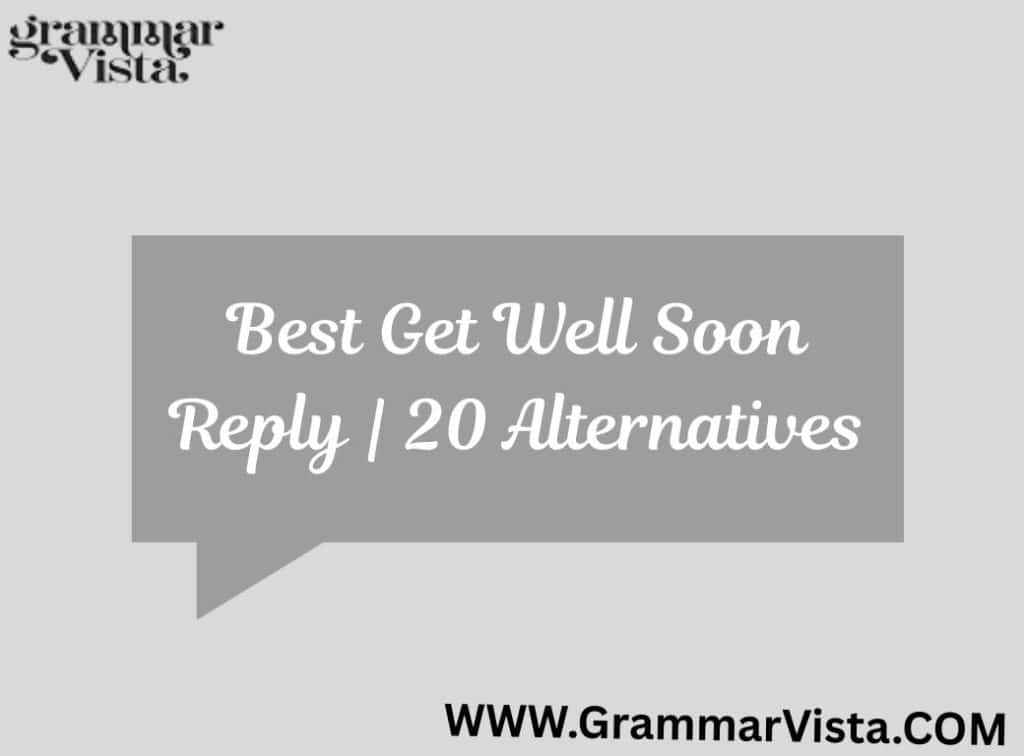Did you know that a simple “Get well soon” can boost someone’s spirits more than a bouquet of flowers? When you’re feeling under the weather, knowing others care can make all the difference. This reading explores the best replies to those heartfelt get well wishes, helping you express gratitude while also sharing your personality. By the end, you’ll have a repertoire of thoughtful and witty Get Well Soon reply that will strengthen your connections during tough times.
Get Well Soon Reply to Choose
Receiving a Get Well Soon message can uplift spirits during tough times, and crafting the perfect get well soon reply is an opportunity to express gratitude while fostering connections. Instead of a simple “thank you,” consider personalizing your response to reflect your unique journey.
“Thank you so much for your kind words. I’m feeling better already!”
When someone reaches out with a heartfelt “Get Well Soon,” it is a beautiful reminder of the support and love that surrounds us, especially during tough times. A thoughtful reply acknowledges their well-wishes and shares a glimpse of your positive progress. This reply thanks the sender and invites future interaction, emphasizing that their support is helping you heal.
By sharing your journey toward recovery, you create an uplifting dialogue that reinforces the bonds of friendship and compassion. Engaging with such positivity can transform a simple exchange into a moment of shared joy and encouragement.
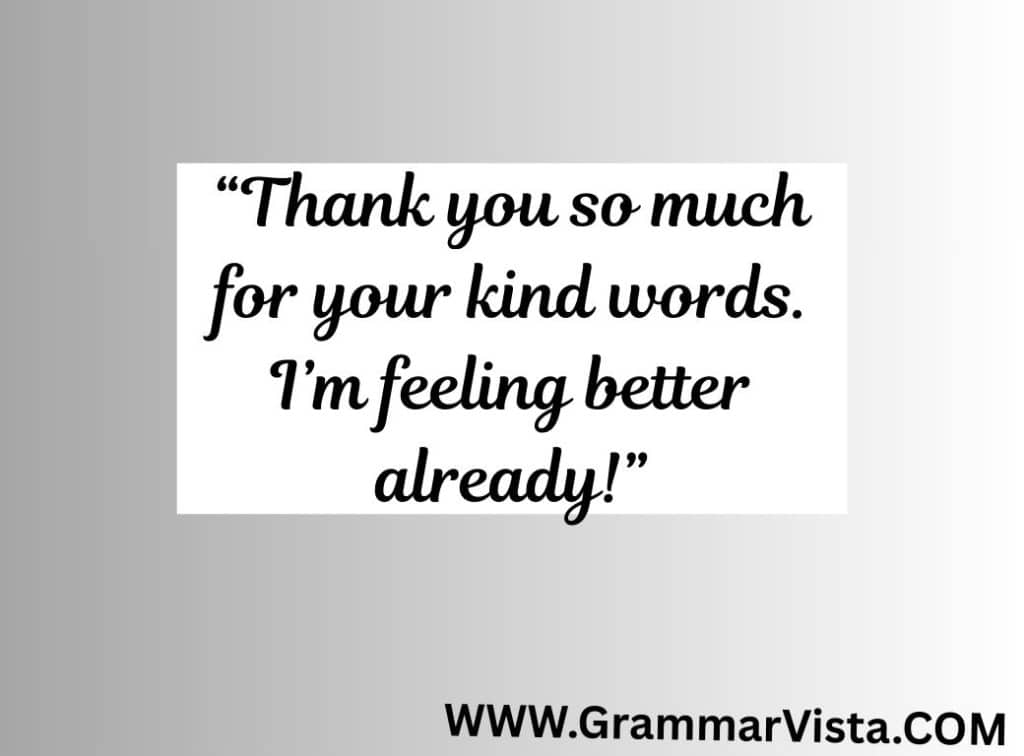
Example: Responding with, “Thank you so much for your kind words. I’m feeling better already!” expresses gratitude and fosters a sense of connection and optimism.
“I really appreciate your support. It means a lot to me.”
When someone takes the time to wish you a “Get Well Soon,” it’s more than just a polite gesture; it’s a heartfelt expression of care and concern. Responding with “I really appreciate your support. It means a lot to me,” shows gratitude and acknowledges the impact of their message.
This simple reply creates a bridge of connection, reinforcing the bond between you and the person offering their well-wishes. Consider adding a personal touch by mentioning how their support has brightened your days during recovery.
Example: You might say, “Your text made me smile when I was feeling down; it truly helps me feel less alone in this.” This kind of response conveys appreciation and invites further conversation, allowing them to feel involved in your healing journey.
“Your message brightened my day. Thank you for thinking of me!”
Receiving a heartfelt “Get Well Soon” message can be a beacon of light during difficult times. When you respond with, “Your message brightened my day. Thank you for thinking of me!” you’re not just acknowledging their kindness; you’re also highlighting how their words had a positive effect on your mood.
This response fosters a deeper connection, reminding both you and the sender that small gestures can create significant ripples of support in our lives. This kind of exchange doesn’t just serve as a polite reply; it creates an opportunity for further engagement, encouraging your friend to continue sharing their positivity and support.
Example: Imagine a friend who took the time to send a thoughtful note while you were under the weather. By expressing gratitude, you reaffirm the power of empathy and compassion. It is a reminder that even in our lowest moments, the warmth of others can uplift us.
“Thanks for your warm wishes. I’m on the mend and feeling better each day.
This response acknowledges their well-wishes and provides an update on your recovery, creating a connection that shows you value their concern. It is a simple yet effective way to express gratitude while reassuring them that you’re on the right path to recovery.
Example: This reply is engaging and optimistic, encouraging continued support from friends and family while reinforcing the bond between you. By sharing your recovery story, you remind others of the power of community in overcoming challenges.
“Your thoughts and prayers are much appreciated. I’m slowly getting better.”
This response expresses appreciation for their concern and provides a brief update on your recovery journey. It acknowledges the support received while subtly inviting further conversation about your health. A thoughtful reply can transform a simple wish into a deeper connection, reminding everyone of the power of community during tough times.
By sharing that you’re in the prayer, you encourage friends and family to stay engaged and check in as you continue to heal. Consider adding a personal touch by mentioning specific things that have helped in your recovery.
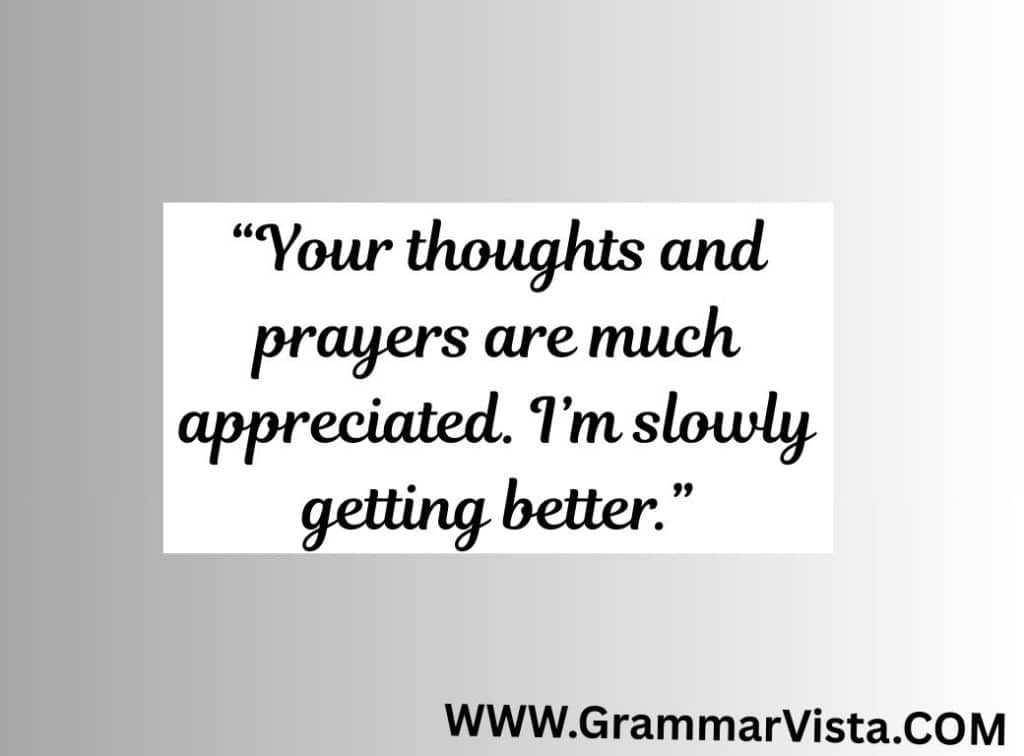
Example: “Your thoughts and prayers are much appreciated. I’m slowly getting better, especially thanks to those home-cooked meals!” This conveys gratitude and highlights the positive impact of their actions, reinforcing the bond between you and your supporters.
“Thank you for your kind message. It’s helping me stay positive during recovery.”
Acknowledging the kindness of those who wish you well during recovery can be incredibly uplifting. A simple response like, “Thank you for your kind message. It’s helping me stay positive during recovery,” expresses gratitude and opens a window into your emotional state.
It allows the sender to feel valued and reinforces the bond between you. You might even add, “Your words are like a warm hug on tough days,” to personalize it further, showcasing how much their support truly means to you.
Example: Saying, “Your encouragement makes a difference; I’m already feeling a bit stronger!” shows that their message is part of your healing journey. This acknowledges their kindness and creates a shared sense of hope and positivity.
“I appreciate your well wishes. It’s comforting to know you’re thinking of me.”
Responding to “Get Well Soon” messages can be a delightful opportunity to connect with others while expressing gratitude. A heartfelt reply, such as “I appreciate your well wishes. It is comforting to know you’re thinking of me,” acknowledges their concern and fosters a sense of community during challenging times.
This simple acknowledgment can strengthen relationships, reminding both parties that support and kindness are invaluable.
Example: Consider responding with, “Your message truly brightened my day! It is reassuring to know I have such thoughtful friends.” This response shows gratitude and invites further conversation, allowing your supporter to feel more involved in your recovery journey.
“Your message means a lot to me. I’m looking forward to feeling better soon.”
Receiving a heartfelt “Get Well Soon” message can truly brighten your day, especially when you’re feeling under the weather. A reply like, “Your message means a lot to me. I’m looking forward to feeling better soon,” conveys appreciation and radiates optimism for the future.
It acknowledges the sender’s thoughtfulness while reinforcing your own resilience and determination to recover. This kind of response fosters a deeper connection, turning a simple gesture into a meaningful exchange.
Example: You might say, “Thank you for your kind words! I can’t wait to be back on my feet and share some laughs with you again.” This expresses gratitude and paints a picture of brighter days ahead. By doing so, you invite the sender into your healing journey, creating a sense of shared hope and anticipation for the good times that lie ahead.
“Thank you for your thoughtful message. I’m taking it one day at a time.”
When someone takes the time to wish you well during a tough moment, responding with gratitude acknowledges their thoughtfulness and reinforces your own positive mindset. A reply like, “Thank you for your thoughtful message. I’m taking it one day at a time,” opens the door to deeper connections.
It shows that you appreciate their concern while subtly sharing your approach to recovery — focusing on small, manageable steps rather than feeling overwhelmed by the bigger picture. By sharing your perspective, you invite others into your journey and may even inspire them.
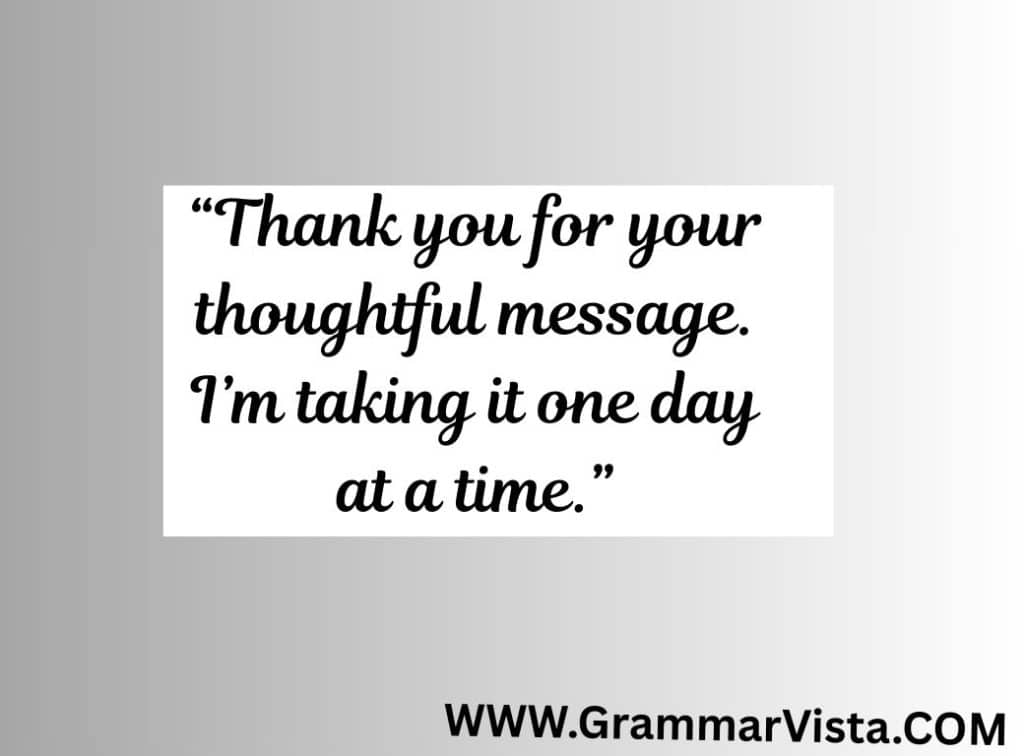
Example: Following up with, “Every little bit of kindness helps me feel stronger,” can turn a simple exchange into a mutual encouragement session. This keeps the conversation light-hearted and fosters a sense of community, reminding both you and your supporters that healing is often a collective effort.
“I’m grateful for your kind words. They’ve helped lift my spirits.”
Receiving a “Get Well Soon” message is like a warm hug in the midst of recovery. When you respond with, “I’m grateful for your kind words. They’ve helped lift my spirits,” it shows appreciation and acknowledges the positive impact their message has had on your journey to wellness.
This response transforms a simple gesture into a meaningful connection, reinforcing the idea that support from loved ones can be a powerful motivator during tough times. Expressing gratitude can foster deeper relationships.
Example: Saying, “Your message reminded me that I’m not alone in this; it truly brightened my day,” enhances the bond and can inspire them to continue offering support as you navigate your recovery. In this way, responding thoughtfully can create a ripple effect of kindness and upliftment, encouraging others to reach out and share their positivity as well.
“Thanks for reaching out. I’m slowly recovering and feeling more hopeful.”
This response acknowledges their message and opens the door for deeper connection. By sharing a glimpse of your progress, you transform a simple exchange into a meaningful conversation. It shows that while you’re navigating a challenging time, the support of friends and loved ones is making a tangible difference.
Remember, every heartfelt reply can inspire someone else to reach out or offer their help, creating a ripple effect of positivity during tough times.
Example: Consider adding a personal touch to your reply, such as, “Your words really lifted my spirits; I’m finding joy in small victories each day.” This conveys gratitude while reinforcing the bond you share. Engaging with your supporters in this way invites them to be part of your journey, fostering a sense of community and shared hope.
“Your well wishes are a great comfort. I’m feeling better each day.”
When someone sends you a heartfelt “Get Well Soon,” it’s more than just a polite gesture; it’s a genuine expression of care and concern. A reply like, “Your well wishes are a great comfort. I’m feeling better each day,” expresses gratitude and provides a positive update on your recovery journey.
This response fosters a sense of connection, showing that their kindness has made a tangible difference in your mood and outlook. This type of reply encourages an ongoing dialogue. By sharing your progress, you invite the sender to remain involved in your healing process.
Example: You might even follow up with something like, “Thanks for thinking of me! I’m looking forward to being back on my feet soon.” Such a response can uplift both parties, reinforcing the bond between you and providing mutual encouragement during challenging times.
“Thank you for your kind support. It’s helping me through this tough time.”
When someone reaches out with a heartfelt “Get Well Soon,” it’s not just a phrase; it’s a gesture of kindness that can significantly uplift your spirits during a challenging time. One effective response is, “Thank you for your kind support. It is helping me through this tough time.” This reply acknowledges their sentiment and emphasizes the importance of community in healing.
By expressing gratitude, you remind both yourself and the other person that you’re not alone on this journey, fostering a sense of connection that can be incredibly comforting. Using this response is particularly impactful when you want to highlight the role of emotional support in recovery.
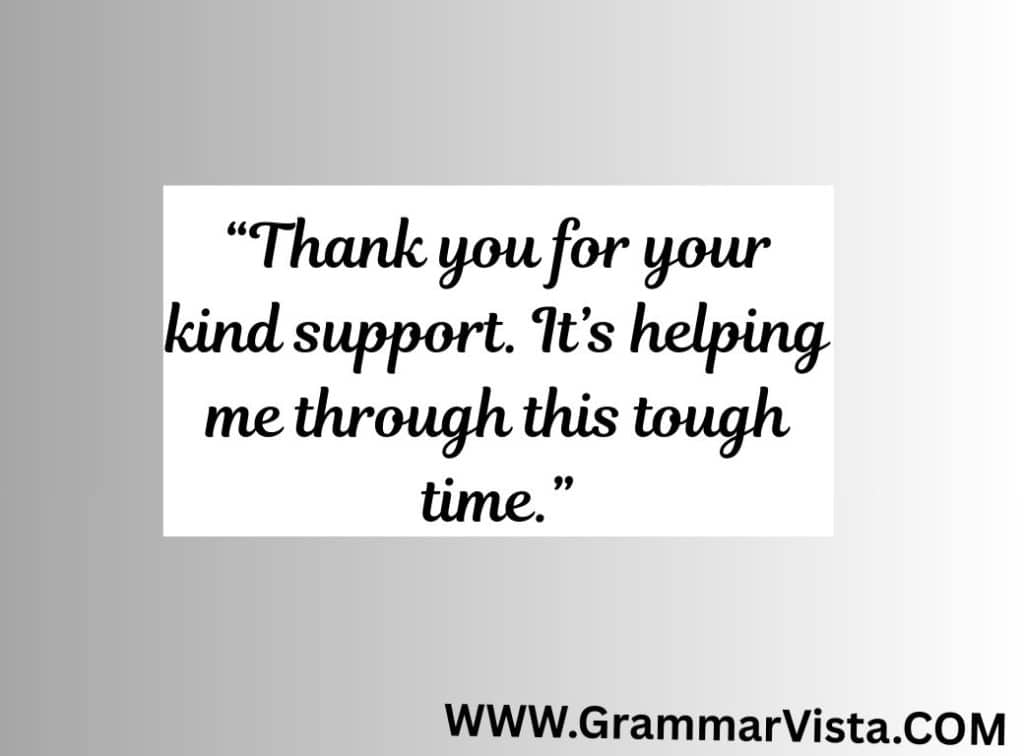
Example: If a friend has been checking in regularly or sending thoughtful messages, acknowledging their efforts reinforces the value of such relationships. It transforms a simple exchange into a deeper conversation about resilience and the power of friendship.
“I’m touched by your message. I’m getting better and hoping to be back to normal soon.”
Receiving a heartfelt “Get Well Soon” message can be a gentle reminder that you’re not alone in your recovery journey. A reply like, “I’m touched by your message. I’m getting better and hoping to be back to normal soon,” acknowledges their thoughtful gesture and shares your optimism about the future.
This response fosters a connection, allowing the sender to feel involved in your healing process while reinforcing your own positive mindset. Expressing gratitude for their concern can deepen relationships and encourage further support.
Example: You might say, “Thank you so much for your kind words! Your message truly brightened my day, and I’m looking forward to being back on my feet soon.” Such replies reflect your appreciation and invite ongoing dialogue, making it easier for friends and family to check in as you recover.
“Thank you for your encouragement. I’m on the mend and feeling positive.”
When someone sends you a heartfelt “Get Well Soon” message, it’s an opportunity to foster connection and share your journey toward recovery. A response like, “Thank you for your encouragement. I’m on the mend and feeling positive,” acknowledges their kindness and invites them into your healing process.
This reply sets a hopeful tone, allowing you to express gratitude while subtly updating them about your progress. Using such a response is particularly effective when you want to share positive news about your recovery without diving into too many details.
Example: If someone has been consistently checking in on you, responding with this message can strengthen that bond, showing them that their thoughts are impactful. By sharing your positive outlook, you uplift yourself and inspire others to see the bright side during tough times.
“Your kind words are much appreciated. I’m feeling a little better each day.”
When someone takes the time to wish you a speedy recovery, it’s not just a simple gesture; it’s a heartfelt acknowledgment of your situation. A response like, “Your kind words are much appreciated. I am feeling a little better each day,” not only expresses gratitude but also provides a glimpse into your healing journey.
This kind of reply fosters connection and encourages your well-wishers to stay engaged, showing that their support is making a difference. In addition to acknowledging their kindness, sharing progress updates can transform the interaction into a more uplifting exchange.
Example: You might say, “Thank you so much for your thoughtful message! I’m starting to regain my energy and hope to be back on my feet soon.” This approach invites positivity and reassures others that their encouragement is valuable. It creates a supportive atmosphere where friends and family feel empowered to continue cheering you on as you recover.
“Thank you for your thoughtful wishes. I’m starting to see improvements.”
“Thank you for your thoughtful wishes. I’m starting to see improvements.” This reply not only acknowledges the kind sentiment but also invites a more personal connection by sharing a glimpse of your recovery journey. It is an uplifting response that allows the well-wisher to feel involved in your healing process, reinforcing the bond of empathy and support between you.
By providing this positive update, you inspire others to continue sending their good vibes your way, reinforcing a cycle of encouragement.
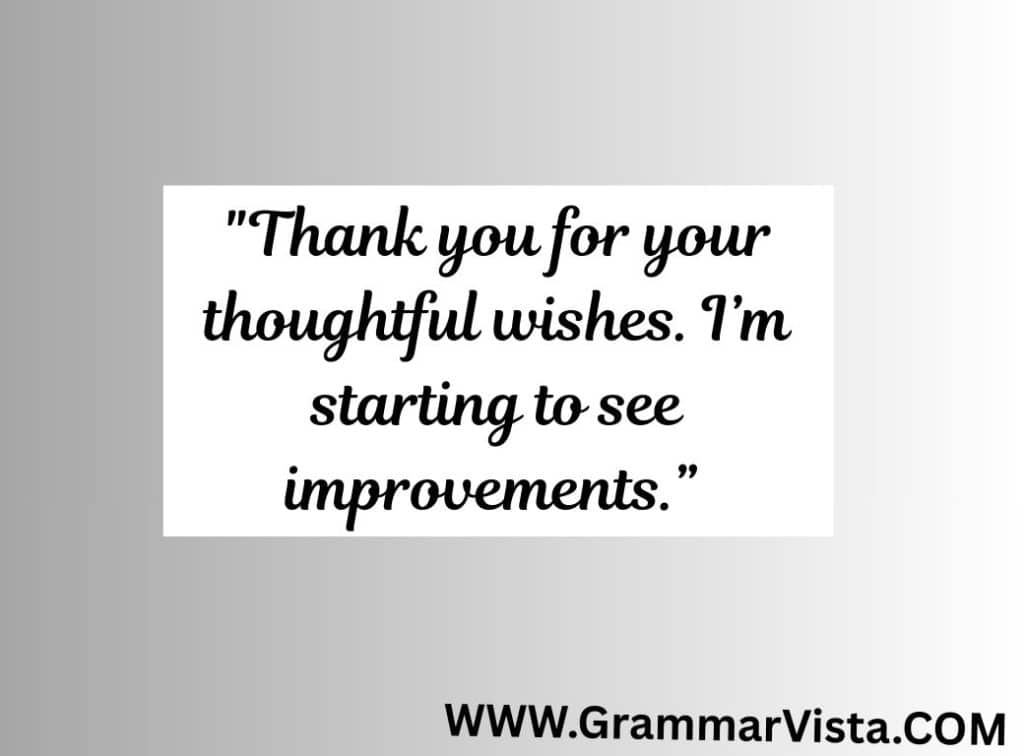
Example: Consider using this phrase when you’ve reached a milestone in your health journey — perhaps you’ve returned to work or enjoyed a day out. It is an excellent way to convey that their messages have made a difference, creating a sense of community around your recovery.
“Your message made me smile. I’m slowly but surely getting back to health.”
This heartfelt response acknowledges the sender’s kindness and conveys how their message uplifted your spirits during a challenging time. It is a gentle reminder that even in moments of vulnerability, the support from loved ones can have a profound impact on our emotional well-being.
Sharing your progress, albeit modest, allows your friend or family member to feel connected to your recovery journey, reinforcing the bond you share. You might consider adding a personal touch by mentioning something specific that made you smile or brightened your day.
Example: “Your message made me smile, especially the part where you mentioned our last adventure together! I’m slowly but surely getting back to health and looking forward to creating more memories like that.” This way, you invite them into your healing process while fostering anticipation for future gatherings.
“Thank you for your support. It’s really helping me get through this.”
When someone takes the time to wish you well during a tough time, acknowledging their support can significantly uplift both your spirits and theirs. A reply like, “Thank you for your support. It’s really helping me get through this,” expresses gratitude and highlights the impact of their kindness on your recovery journey.
This simple acknowledgment creates a positive feedback loop; the person feels valued for their concern, which can motivate them to continue offering their support. A thoughtful response can pave the way for deeper connections.
Example: You might follow up with something like, “Your messages have been a bright spot in my day, reminding me I’m not alone in this.” This recognizes their efforts and invites further interaction, potentially leading to more meaningful conversations.
“I’m grateful for your good wishes. I’m feeling more optimistic about my recovery.”
Receiving a heartfelt “Get Well Soon” message can be incredibly uplifting, especially during challenging times. A response like, “I’m grateful for your good wishes. I’m feeling more optimistic about my recovery,” shows appreciation and shares a positive outlook on your healing journey.
It acknowledges the support of loved ones while reinforcing your own resilience, creating a wonderful loop of encouragement. By expressing gratitude, you invite deeper connections and foster a sense of community around your recovery.
Example: Saying, “Your kind words mean so much to me. I can already feel my spirits lifting!” reinforces the positivity of their message and allows you to reflect on the importance of social support in healing. This kind of exchange can motivate others to continue reaching out, creating an atmosphere of love and support that can significantly enhance your overall well-being.
Conclusion
Responding to “Get Well Soon” messages can be a thoughtful way to acknowledge the support and care you receive during challenging times. Whether you choose a light-hearted response or a more heartfelt reply, expressing gratitude is key to strengthening your connections with friends and loved ones.
Remember, simple get well message are not just words; it carry warmth and encouragement that can uplift your spirits. Don’t hesitate to customize your replies to reflect your personality and relationship with the sender. So next time someone wishes you well, take a moment to craft a meaningful get well soon reply that shows your appreciation!

